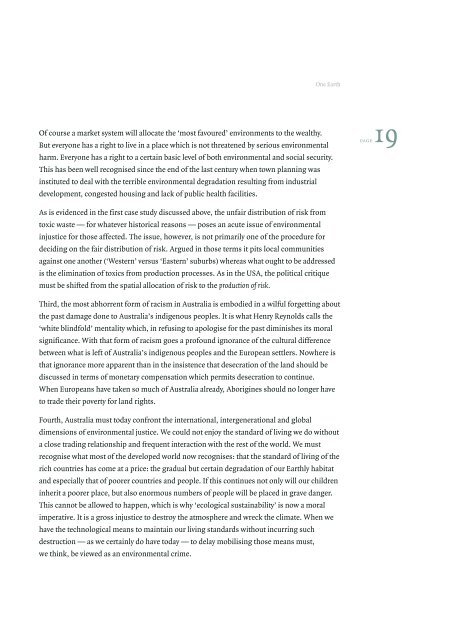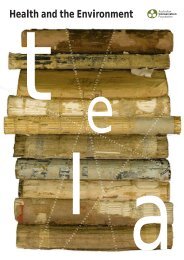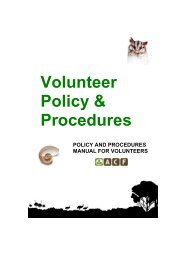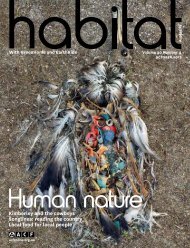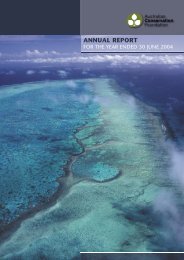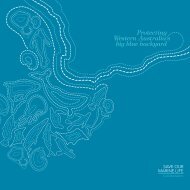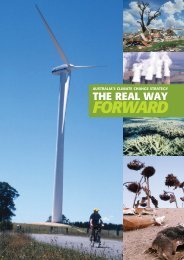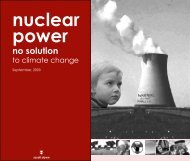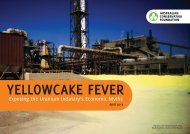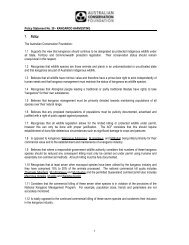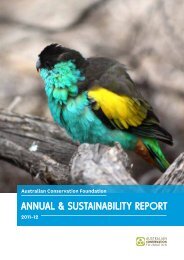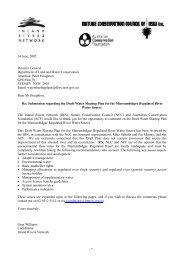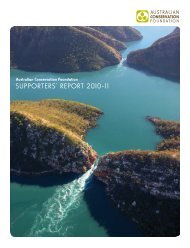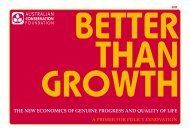Social & Environmental Justice - Australian Conservation Foundation
Social & Environmental Justice - Australian Conservation Foundation
Social & Environmental Justice - Australian Conservation Foundation
- No tags were found...
You also want an ePaper? Increase the reach of your titles
YUMPU automatically turns print PDFs into web optimized ePapers that Google loves.
One EarthOf course a market system will allocate the ‘most favoured’ environments to the wealthy.But everyone has a right to live in a place which is not threatened by serious environmentalharm. Everyone has a right to a certain basic level of both environmental and social security.This has been well recognised since the end of the last century when town planning wasinstituted to deal with the terrible environmental degradation resulting from industrialdevelopment, congested housing and lack of public health facilities.page19As is evidenced in the first case study discussed above, the unfair distribution of risk fromtoxic waste — for whatever historical reasons — poses an acute issue of environmentalinjustice for those affected. The issue, however, is not primarily one of the procedure fordeciding on the fair distribution of risk. Argued in those terms it pits local communitiesagainst one another (‘Western’ versus ‘Eastern’ suburbs) whereas what ought to be addressedis the elimination of toxics from production processes. As in the USA, the political critiquemust be shifted from the spatial allocation of risk to the production of risk.Third, the most abhorrent form of racism in Australia is embodied in a wilful forgetting aboutthe past damage done to Australia’s indigenous peoples. It is what Henry Reynolds calls the‘white blindfold’ mentality which, in refusing to apologise for the past diminishes its moralsignificance. With that form of racism goes a profound ignorance of the cultural differencebetween what is left of Australia’s indigenous peoples and the European settlers. Nowhere isthat ignorance more apparent than in the insistence that desecration of the land should bediscussed in terms of monetary compensation which permits desecration to continue.When Europeans have taken so much of Australia already, Aborigines should no longer haveto trade their poverty for land rights.Fourth, Australia must today confront the international, intergenerational and globaldimensions of environmental justice. We could not enjoy the standard of living we do withouta close trading relationship and frequent interaction with the rest of the world. We mustrecognise what most of the developed world now recognises: that the standard of living of therich countries has come at a price: the gradual but certain degradation of our Earthly habitatand especially that of poorer countries and people. If this continues not only will our childreninherit a poorer place, but also enormous numbers of people will be placed in grave danger.This cannot be allowed to happen, which is why ‘ecological sustainability’ is now a moralimperative. It is a gross injustice to destroy the atmosphere and wreck the climate. When wehave the technological means to maintain our living standards without incurring suchdestruction — as we certainly do have today — to delay mobilising those means must,we think, be viewed as an environmental crime.


